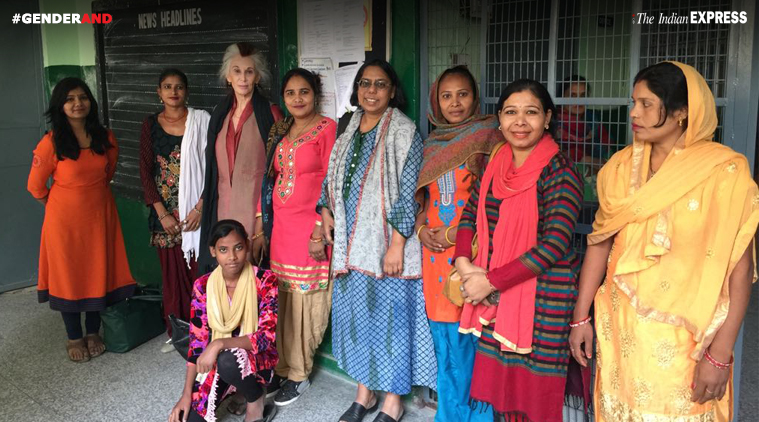Can the flap of a butterfly trigger a tornado miles way? American feminist and lawyer Catharine MacKinnon uses this metaphor to argue in her recent book, “Butterfly Politics”, that seemingly minor interventions carried out in the right way can produce enormous transformations in the social and cultural domains. The book is compilation of her 40-plus years of feminist activism wherein a minor moment of intervention in the form of an idea or speech has gone on to produce huge effects in shifting male dominance. MacKinnon, who is well known for her work against sexual harassment and pornography in the legal domain, was in India recently to bring out her book and also to continue her work with activist Ruchira Gupta’s ‘Apne Aap,’ that works with women vulnerable to being in prostitution in India.
Explaining the metaphor ‘butterfly politics’ in context with the work she is doing with Apne Aap, MacKinnon says “we understand that the last girl is the person who is most vulnerable to prostitution, on the basis of caste, class, sometimes religion, age certainly and gender. She is our butterfly. She is the one. When she can open her wings, she is the one who is changing the world.”
In a conversation with Indianexpress.com, MacKinnon explained how the theory of butterfly politics can be applied to India and the #MeToo campaign, which she believes is one of the best illustrations of how butterfly interventions produce social changes.
Q. What is the metaphor of butterfly politics?
It comes from Conrad Lawrence, a scientist who asked the question in 1974 in a talk. Can the flap of a butterfly’s wings in Brazil, produce a tornado in Texas? And when he answered yes, he coined what has come to be called the butterfly effect. It means that small simple actions that intervene in an unstable environment can ultimately produce cataclysmic consequences including systemic transformations in the domain of that intervention, worlds away.
Q. How are you using this metaphor in context of the legal system and societal structure?

In what I call butterfly politics, politics refers to power structured relations. What I am doing is, bringing together forty plus years of activism, legal and political, for shifting the politics of male dominance, in a way that gives women some real rights and alters women’s status relative to men. The way the metaphor works, is to look at each of a series of interventions that originally seemed small and isolated in particular local environments and trace the way they have had actually major consequences. That includes originating the legal claim for sexual harassment as sex discrimination.
Also, the work on pornography, which includes proposing a human rights law that would make it possible for people who are harmed through pornography and can prove their harm to recover their damages from the pornographers. Among other initiatives, I worked with Bosnian women to create a legal claim for rape in the genocide and have cooperated with international tribunals to redefine rape internationally in terms of coercion rather than consent (Catherine MacKinnon filed a civil lawsuit against Radovan Karadžic, the leader of the Bosnian Serbs, for genocidal acts of rape, enforced prostitution, other forms of torture, and extrajudicial killings).
Also, in 1990 I proposed what has become the Swedish model in addressing prostitution in Sweden. Then, Swedish women worked on it for a decade and got it passed. The concept is to decriminalise anyone who is sold in prostitution and strongly criminalising not only pimps and traffickers, but the real initiative is to criminalise the buyer, the person with the real power.
So the idea of butterfly politics is to capture the butterfly moment in which some of the ideas that have now become quite familiar, when they first opened its wings in the world, most of them were things I had never published before. They were just things somebody taped when I said it the first time or a speech I gave somewhere and people went ahead and did it. So all those are collected in the book.
 Catherine MacKinnon was in India recently to bring out her book and also to continue her work with activist Ruchira Gupta’s ‘Apne Aap,’ that works with women vulnerable to being in prostitution in India. (Photograph provided by Ruchira Gupta)
Catherine MacKinnon was in India recently to bring out her book and also to continue her work with activist Ruchira Gupta’s ‘Apne Aap,’ that works with women vulnerable to being in prostitution in India. (Photograph provided by Ruchira Gupta)
Q. In a country like India, where cultural mores drive much of the way the legal system works, even if a change does take place because of a butterfly effect, what next?
Well there is no butterfly effect if it does not change society. The whole point is that law is not an artificial instrument. First of all, it takes a social change to produce a law. Then the law actually has an effect on people’s attitudes and behaviours. Until it starts producing social changes, you don’t have the butterfly effect. So for example with sexual harassment, we did that in the 70s and we only now have the #MeToo movement which is the real social change. What its doing is that without even legal interventions taking place, you have white male money, abandoning white man overnight. What we call this in law is voluntary compliance. In other words, you don’t have to bring a sexual harassment case. What has happened is that something that was a privilege of power has been transformed into a disgrace. That is the social change, that is where you get the butterfly effect.
Q. What happens when there is impatience with institutional mechanisms and the long, lengthy process of law? For instance, in the context of what is referred to as the “Raya Sarka list”, would that be a moment?
There are real problems with the institutional mechanisms. They need to be improved. Processes within universities and companies need to be improved. The fact that people have not used them even where they are available shows a lack of faith in them. That usually means that they experience few positive consequences and a lot of barriers and stigma and challenges, where they should experience receptivity, support and belief. That said, the list that was put out is a bit problematic when it does not include the particulars of which the individuals are being accused. Some of that was on that list. But there are some people who just have their names on there and maybe they know what they did and maybe they did not do something. It is quite important to have the specifics there.
For example, the situation with Harvey Weinstein would never have produced the consequences it has, if the journalists who investigated him, and the people who accused him had not done such an in depth job. They interviewed people and checked out the facts and cross-referenced accounts. All of this kind of investigation, together with the particulars, produced a picture which showed that he did very similar things over and over again to women. That is much more powerful and credible and it produces more protection for the people who are bringing the claims and encourages more people to come forward then. But if you just had a list and on it was Harvey Weinstein on one side and on the other side were these women, the ones who are named, that would not have been as potent. In order to have the powerful effects that we have seen, there needs to be a foundational legitimacy for what is being said in the first place.

Q. A change in law can produce more stringent punishments and can hold the accused guilty, can it really deter crime?
The effect of law is not just when someone brings a case and someone goes to jail. That is the least important effect of it. The most important effect is that it changes the legitimacy of the act. For example, if marital rape was a crime then it is possible to think about the sex one has in marriage as something in which the most force that a man can exert on a person is not automatically allowed. So then in a marriage a woman can think that maybe the sex she has is something she actually wants to be having. It has nothing to do with putting your husband in jail.
In the Harvey Weinstein case, sexual harassment has been delegitimised now for 40 years. But suddenly we have men saying that they are not going to put this guy’s movie on air. You can’t sue for that. Nobody got a lawsuit to produce that consequence and you couldn’t. What we have done is delegitimised people who behave in this way so that other people dont want to associate with them. That is the effect I am talking about. That is social change.
(#GenderAnd is dedicated to the coverage of Gender. Follow our reportage here)










